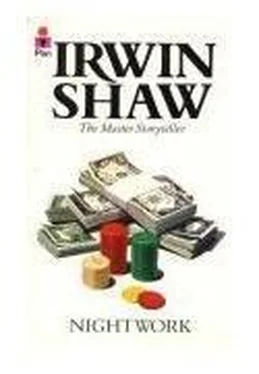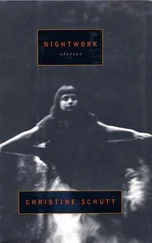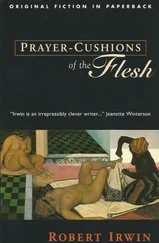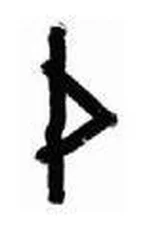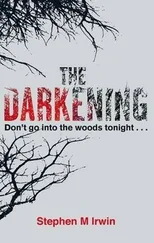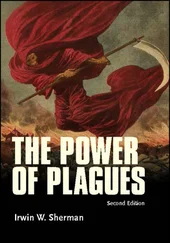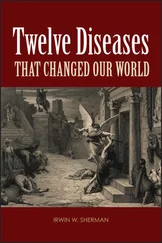Irwin Shaw - Nightwork
Здесь есть возможность читать онлайн «Irwin Shaw - Nightwork» весь текст электронной книги совершенно бесплатно (целиком полную версию без сокращений). В некоторых случаях можно слушать аудио, скачать через торрент в формате fb2 и присутствует краткое содержание. Жанр: Детектив, на английском языке. Описание произведения, (предисловие) а так же отзывы посетителей доступны на портале библиотеки ЛибКат.
- Название:Nightwork
- Автор:
- Жанр:
- Год:неизвестен
- ISBN:нет данных
- Рейтинг книги:3 / 5. Голосов: 1
-
Избранное:Добавить в избранное
- Отзывы:
-
Ваша оценка:
- 60
- 1
- 2
- 3
- 4
- 5
Nightwork: краткое содержание, описание и аннотация
Предлагаем к чтению аннотацию, описание, краткое содержание или предисловие (зависит от того, что написал сам автор книги «Nightwork»). Если вы не нашли необходимую информацию о книге — напишите в комментариях, мы постараемся отыскать её.
Nightwork — читать онлайн бесплатно полную книгу (весь текст) целиком
Ниже представлен текст книги, разбитый по страницам. Система сохранения места последней прочитанной страницы, позволяет с удобством читать онлайн бесплатно книгу «Nightwork», без необходимости каждый раз заново искать на чём Вы остановились. Поставьте закладку, и сможете в любой момент перейти на страницу, на которой закончили чтение.
Интервал:
Закладка:
“No matter. Do you think that in the stuff you took from Mom’s house you might find my birth certificate?”
“Come on over to the house for dinner and we’ll look for it together.”
“I’d rather Madge didn’t know I was in town, Hank,” I laid.
“Oh.” The worry set in immediately.
“Do you think you might see if you could find it this afternoon and then come over to the Hilton and have dinner with me. Alone?”
“But why…?”
“I’ll explain later. Can you manage it?”
“I’ll be there a quarter after six.”
“In the bar.”
“That’s no hardship.” Henry chuckled. It was a drinker’s chuckle.
“See you then,” I said and hung up. I sat on the edge of the single bed in the nondescript hotel room, my hand on the telephone, wondering if it wouldn’t have been better to have written Harrisburg and waited the two weeks and never have come back to Scranton, never have said anything to my brother. I shook my head. If you wanted to figure out what your future was going to be, you had to have a firm grasp on your past. And my brother Henry was a big part of my past.
Because our father had died when Henry was twenty and all the other children much younger, and Henry had taken on the responsibility of the male head of the family automatically, without fuss. I had learned to respect him and depend on him. It was easy to depend on Henry. He was an outgoing, uncomplicated, clever boy, quick in his studies (he always led his class, always was elected class president, and got a scholarship to the University of Pennsylvania). He had a knack for business, too, and was generous to the other children, especially to me, with the money he made after school and in the summers. As our mother kept repeating, he was the one of her children who was born to be rich and successful. It was Henry who fought our mother and overcame her objections when I decided I wanted to learn to fly. Henry had also financed the flying school. By that time he was a certified public accountant, doing fairly well for his age, and already married.
Through the years, I had paid back the money Henry had lent me, although Henry had never once asked me for a penny. But we had not seen each other often. We lived in different parts of the world, and Henry was involved with his growing family and his wife, Madge. Because of the scandal of my younger brother, Bert, the few times that we had all been together Madge had been uncomfortably persistent in trying to find out why I was not yet married.
Because of everything, my brother Henry was one of the people in my life who somehow made me feel guilty, lacking in feeling. I knew that I had received much more than I had given and the imbalance disturbed me. I was glad now that the bureaucracy in Harrisburg had forced me to come to my home town and once more ask my brother to help me.
I was shocked when I saw him come into the bar. I had not seen him for five years, and Henry had been a powerfully built, erect, confident-seeming man then. Now he looked as though the five years had ravaged him. He seemed diminished, bent. His hair had thinned and what was left was stringy, yellowish-gray. He wore thick, gold-rimmed spectacles that bit deep into the bridge of his nose. He had always had fine eyes, deep-colored, like all the family, and keen of sight, and the glasses did not become him. Even in the half-light of the bar, Henry reminded me of a small, worried animal peering fearfully out of a hole, ready to scuttle back at the first sign of danger.
“Over here, Hank,” I said, standing up.
We shook hands wordlessly. I was sure Henry knew the changes that had taken place in him were apparent and that I was trying to hide my reaction to them.
“You’re in luck,” Henry said. “I found it right off.” He reached into his pocket and took out a yellowed envelope and gave it to me. I slipped out the certificate. There it was. My identity was confirmed. Douglas Traynor Grimes, citizen, born in America, male, son of Margaret Traynor Grimes, heir to the continent.
While I was examining the frail piece of aging paper, Henry was fussily taking off his coat and folding it on a chair. The coat was worn at the cuffs and elbows. “What’ll it be, Hank?” I asked, overly hearty, false. “An old-fashioned will do it.” His voice had somehow remained the same, full and deep, like a cherished and lovingly polished relic from better days.
“The same,” I said to the waiter, who was standing at the table.
“Well, boy, well,” Henry said. “The Prodigal returns.” If I closed my eyes the voice was still my brother.
“Not exactly. More of a refueling stop, I would say.”
“You’re not flying anymore?”
“I wrote you that.”
“That’s the only thing you wrote me,” Henry said. “I’m not complaining, you understand.” He spread his hands in a placating gesture. I noticed that the hands shook a little-Holy God, I thought, he’s only forty years old. “The world’s a busy place,” Henry said. “Communication is difficult. Time passes. Brothers go their different ways.”
We toasted each other when the drinks came. Henry drank greedily, half the glassful in one gulp. “After a day in the office,” he said, catching my glance. “Those’re long days in that office.”
“I can imagine,” I said. “Now tell me the news,” Henry said.
“You tell me the news,” I said, “Madge, the kids et cetera, et cetera.”
There were two more drinks for Henry while he told me about Madge and the kids. Madge was fine, a little run down taking care of everything with no help and the PTA and teaching a stenographic course at night, the three daughters were lovely, the oldest at fourteen something of a problem, high-strung, the way kids that age these days were likely to be, and having a little psychiatric help. The photographs came out of the wallet, the family beside a lake in the Poconos, all the females brown, robust, and cheerful. Henry, in a pair of bathing trunks that were too big for him, pale and worried-looking, as though a drowning was imminent. The news of our brother Bert was not surprising. “He’s a fag radio announcer out in San Diego,” Henry said. “We should have seen it coming. Did you see it coming?”
“No.”
“Well, these days, it’s not so bad, I suppose,” Henry said with a sigh. “Still, in our family … Pa would have split a gut. He’s got a good heart, Bert, he always sends the kids gifts on Christmas from California, but I wouldn’t know what to do with him if he ever showed up here.”
Our sister Clara, the youngest of the family, was married, in Chicago, with two kids, did I know that?
“I knew about her being married. Not about the kids.”
“We don’t see much of her either,” Henry said. “Families sort of just disintegrate, don’t they? In a few years I suppose my kids’ll go off, too, and Madge and I’ll be sitting home looking at the television together.” He laughed ruefully. “Happy thoughts. Still, there’s one good thing. The bastards’ never be able to drag any son of mine off and kill him in one of their goddamn wars. What a country, where you thank God you don’t have a son. More happy thoughts.” He shook, himself, as though the conversation had gotten away from him onto subjects that would have been better left unexamined. “Don’t you think it’s time for another drink?”
I still had my first glass almost full in front of me, but he ordered two more. In a little while Henry would be drunk. Maybe that explained it all, although I knew it never explained it all.
“Clara’s doing all right,” Henry was saying. “At least that’s what she writes us. When she writes us. Her husband’s a big shot in a brokerage firm out there. They have a boat on the lake. Imagine that – a Grimes with a yacht. Okay, enough about all of us. What about you?”
Читать дальшеИнтервал:
Закладка:
Похожие книги на «Nightwork»
Представляем Вашему вниманию похожие книги на «Nightwork» списком для выбора. Мы отобрали схожую по названию и смыслу литературу в надежде предоставить читателям больше вариантов отыскать новые, интересные, ещё непрочитанные произведения.
Обсуждение, отзывы о книге «Nightwork» и просто собственные мнения читателей. Оставьте ваши комментарии, напишите, что Вы думаете о произведении, его смысле или главных героях. Укажите что конкретно понравилось, а что нет, и почему Вы так считаете.
